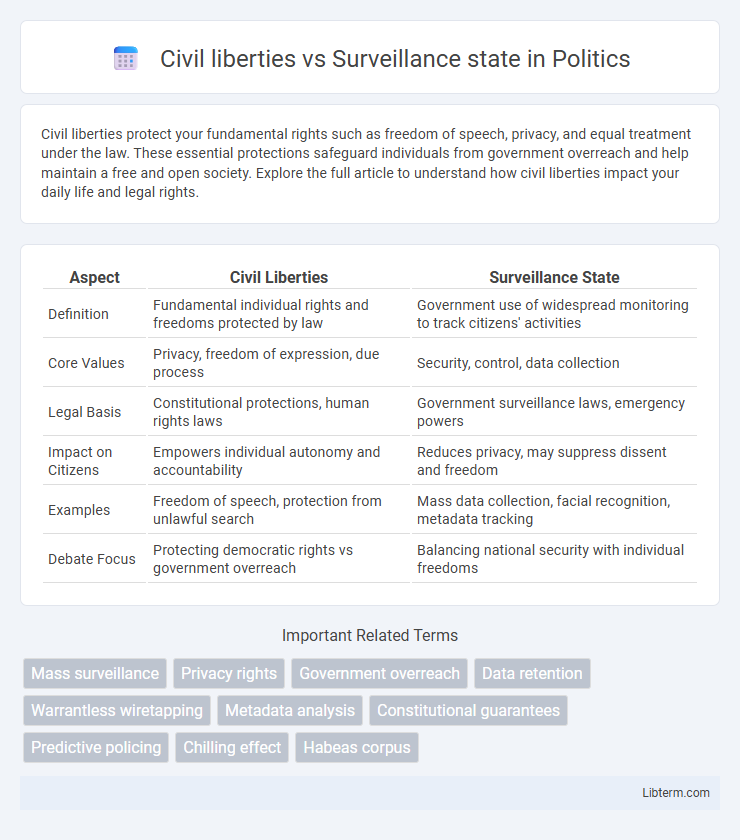Civil liberties protect your fundamental rights such as freedom of speech, privacy, and equal treatment under the law. These essential protections safeguard individuals from government overreach and help maintain a free and open society. Explore the full article to understand how civil liberties impact your daily life and legal rights.
Table of Comparison
| Aspect | Civil Liberties | Surveillance State |
|---|---|---|
| Definition | Fundamental individual rights and freedoms protected by law | Government use of widespread monitoring to track citizens' activities |
| Core Values | Privacy, freedom of expression, due process | Security, control, data collection |
| Legal Basis | Constitutional protections, human rights laws | Government surveillance laws, emergency powers |
| Impact on Citizens | Empowers individual autonomy and accountability | Reduces privacy, may suppress dissent and freedom |
| Examples | Freedom of speech, protection from unlawful search | Mass data collection, facial recognition, metadata tracking |
| Debate Focus | Protecting democratic rights vs government overreach | Balancing national security with individual freedoms |
Defining Civil Liberties in the Modern Era
Civil liberties in the modern era encompass fundamental rights such as freedom of speech, privacy, and protection from arbitrary government intrusion, safeguarded by constitutions and international human rights frameworks. The rise of digital technologies and expansive surveillance programs challenges these liberties by enabling unprecedented data collection and monitoring of individuals' activities. Balancing civil liberties with national security requires transparent oversight, clear legal boundaries, and robust data protection to prevent state overreach and preserve democratic principles.
The Rise of the Surveillance State
The rise of the surveillance state has intensified debates over civil liberties, as governments increasingly deploy advanced technologies such as facial recognition, data mining, and mass electronic monitoring to track citizens. This expansion threatens fundamental rights like privacy, freedom of expression, and protection against unlawful searches, often justified by national security concerns. The growing surveillance infrastructure challenges legal frameworks, prompting calls for stricter regulations and transparency to safeguard individual freedoms.
Historical Context: Privacy vs. Security
Throughout history, the balance between civil liberties and the surveillance state has hinged on the tension between privacy and security, notably during periods of war and political unrest. Landmark events such as the implementation of the USA PATRIOT Act post-9/11 and the Church Committee revelations in the 1970s highlight the recurring conflict between government surveillance programs and individual rights. The evolution of technology has continually reshaped this dynamic, raising critical debates over mass data collection, warranting robust legal frameworks to protect constitutional freedoms.
Legal Frameworks Governing Surveillance
Legal frameworks governing surveillance vary significantly across countries, balancing state security interests with individual civil liberties protections. Key regulations like the U.S. Foreign Intelligence Surveillance Act (FISA) and the European Union's General Data Protection Regulation (GDPR) define limits on government surveillance activities and data collection. These laws mandate oversight mechanisms, transparency requirements, and safeguards to prevent abuse of surveillance powers and protect citizens' rights to privacy and freedom of expression.
Technological Advances and State Monitoring
Technological advances such as artificial intelligence, facial recognition, and big data analytics have significantly expanded the capabilities of state monitoring, enabling unprecedented levels of surveillance on individuals. This growth heightens concerns over civil liberties, particularly the right to privacy, freedom of expression, and protection from arbitrary state intrusion. Balancing the benefits of technological tools for security with the preservation of fundamental human rights remains a critical challenge in democratic societies.
Impact of Surveillance on Freedom of Expression
Surveillance states often undermine civil liberties by chilling freedom of expression through pervasive monitoring and data collection, leading individuals to self-censor out of fear of government scrutiny. Studies show that increased surveillance correlates with reduced political activism and limited public dissent, particularly in authoritarian regimes. Protecting privacy rights and limiting state surveillance are critical to preserving open discourse and democratic participation.
Balancing National Security and Individual Rights
Balancing national security and individual rights requires carefully defining the limits of surveillance to protect civil liberties such as privacy, freedom of expression, and due process. Effective oversight mechanisms and transparent legal frameworks ensure that intelligence agencies operate within constitutional boundaries while addressing threats to public safety. Advanced technologies must be deployed with strict accountability measures to prevent abuses that could erode democratic freedoms in a surveillance state.
Public Perception and Trust in Government
Public perception of the balance between civil liberties and a surveillance state significantly impacts trust in government institutions. Surveys indicate that excessive surveillance often correlates with diminished public confidence and heightened concerns over privacy erosion. Transparent policies and robust legal safeguards are essential for maintaining citizen trust while addressing security needs.
Case Studies: Surveillance Abuse and Civil Rights Violations
Surveillance abuse in cases like Edward Snowden's revelations exposed mass data collection infringing on citizens' privacy rights, igniting global debates on civil liberties versus national security. China's extensive use of facial recognition and social credit systems demonstrates how surveillance state mechanisms can suppress dissent and violate freedom of expression. These instances highlight the critical need for transparent oversight and legal frameworks to protect civil rights against unchecked surveillance powers.
Future Challenges for Civil Liberties in a Digital World
The increasing integration of advanced surveillance technologies such as facial recognition, AI-powered data analytics, and pervasive internet monitoring presents significant future challenges for civil liberties, including privacy erosion and freedom of expression restrictions. Governments and corporations can exploit these technologies to exert extensive control, making it crucial to develop robust legal frameworks and digital rights protections. Balancing national security interests with individual freedoms demands innovation in encryption, transparent data governance, and enhanced public awareness to safeguard human rights in the evolving digital landscape.
Civil liberties Infographic

 libterm.com
libterm.com